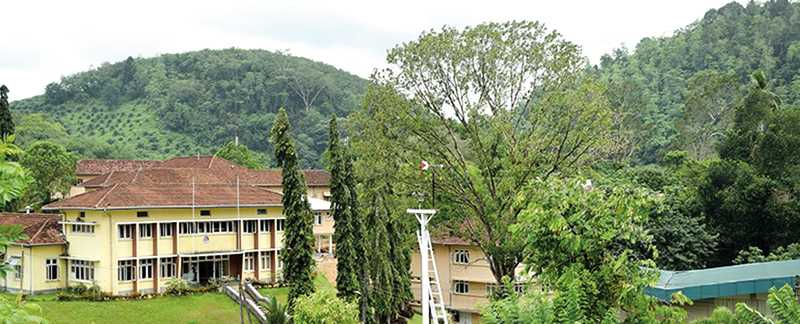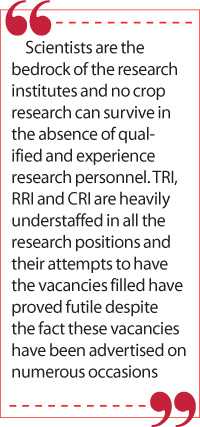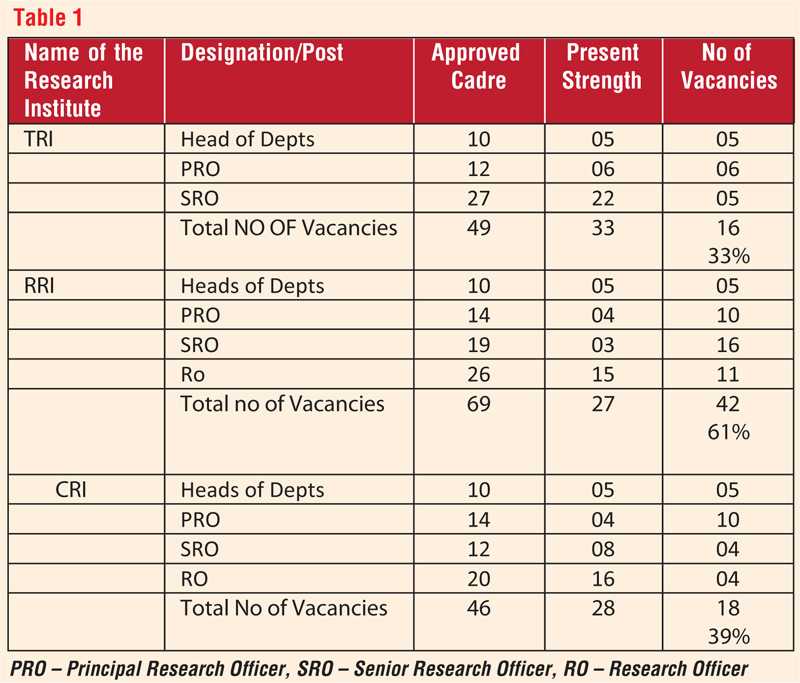Wednesday Feb 25, 2026
Wednesday Feb 25, 2026
Friday, 20 November 2020 02:10 - - {{hitsCtrl.values.hits}}

The post of RRI Director is a venerated position both locally and internationally, and the inordinate delay (nine months) and studious silence in filling this post insinuates a well-planned ruse in the pipeline, probably with an ulterior motive to select a stooge, ignoring the time-tested scheme of recruitment
By J.A.A.S. Ranasinghe
There is a heavy tendency for the qualified and experienced research officers to leave the three key research institutes, namely Tea Research Institute (TRI), Rubber Research (RRI) and Coconut Research Institute (CRI), after obtaining post graduate qualifications preferably at the PhD level in order to join our national universities, lock, stock and barrel, leaving a huge void in the respective research institutes.
Obviously, one cannot expect the research institutes to deliver the research obligations in the absence of the qualified research personnel and this is a bane of the core weaknesses all the research institutes are confronted with right at the moment.
Scientists are the bedrock of the research institutes and no crop research can survive in the absence of qualified and experience research personnel. For curiosity purposes, I give the number of vacancies available in the research cadres of all the three crop research institutes as at 1 October 2020 (Table 01).
 |
 |
It is abundantly clear from table 1 that TRI, RRI and CRI are heavily understaffed in all the research positions and their attempts to have the vacancies filled have proved futile despite the fact these vacancies have been advertised on numerous occasions.
In the case of TRI and CRI, almost one-third (33%) remain vacant which includes Heads of Department, Principal Research Officers and Senior research Officers. The tea sector is the most vulnerable sector that generates billions of foreign exchange to the national coffers. The tea sector will face a debilitating impact in the years to come because of the heavy exodus of its research cadre.
The sad episode is that the positions of heads of department in almost all three research institutes have five vacancies each at the moment and it is this category that has a distinctive demand from the universities to join their academic staff. The principal research officers of all the research institutes woefully inadequate and it is difficult to fathom as to how these institutes would respond to a calamitous situation, leave aside the normal day-to-day research required.
The labour outturn of research officers with PhD qualifications is reported to be excessively high in that approximately eight to 10 research officers are leaving the research institutes to take up academic positions in the universities. Regrettably, all research institutes are reported to be on the verge of collapse due to the inability to retain their research officers to conduct research.
In almost all the research institutes, the research positions are dwindling at a precipitously accelerated rate and it will be nigh well possible to retain them, as universities have resorted to headhunt them at the expense of the research institutes.
The worst-affected research institute is the RRI where 61% of the vacancies remain vacant, as universities prefer to absorb RRI scientists due to the research background with industrial exposure. The situation is so aggravated that research officers even with two years’ experience in the RRI have been selected by the universities. At this rate of leaving, the research institutes would inevitably get operationally paralysed and research projects will come to a standstill in the years to come.
There has been hardly any attempt to arrest this exodus trend by the institutes, Ministry of Plantation Industries and the General Treasury. Unfortunately, there has not been any noteworthy effort by the Ministry of Plantation, Salaries and Cadre Commission and the General Treasury to arrest the alarming exodus of scientists. The most unfortunate situation is even the Central Bank Report 2019 has not highlighted heavy exodus of scientists to join the universities and suggested remedial measures to avert this floodgate.
Impact of monolithic trade unions
It is to be noted here that prior to year 2000, the salaries, allowances and other perks of the research institutes were the second highest next to Central Bank and therefore research institutes were at a distinctive advantage to recruit cream of the cream passed out from the universities to their research cadre. But this scenario changed with the emergence of the powerful trade union of the academic staff of the universities commonly called FUTA – Federation of Universities Teachers Association and this monolithic trade union exercised their trade union muscle in redressing their grievances in relation to salary, allowances and other perks.
The bargaining capacity of FUTA has been very aggressive and its political affiliations with the governments in power enabled them to enhance the salaries, allowances and other perks surpassing the research staff as a result. The Salaries and Cadre Commission and the General Treasury when granting higher emoluments to university academics were absolutely unmindful of the deleterious impact the research institutes would have to undergo as a result of their short-sighted action and today research institutes have become a victim.
Could anyone just imagine the sense of frustration, deterioration of morale and commitment of the scientists when the academic staff of the universities with same qualifications draw a three-fold increase in their salaries and allowances? This huge salary and allowance anomaly could only be rectified by allowing the same benefits to miniscule staff of the scientists, if the Government has a modicum of decency and concern for the research community. Now that the annual Budget is around the corner it is sincerely hoped that the Government will seriously consider addressing this longstanding grievance.
Age of retirement
Another matter of serious concern is the compulsory age of retirement for the research staff and the academic staff of the universities. In case of academic staff, the age of retirement is 65 years of age whereas scientists will have to retire from service on attaining the age of 60.
There are a number of scientists who have left the service of the research institutions on the verge of their retirement in order to take up academic appointments. At a time when there is a severe dearth of scientists in the research institutes, it is best that the retirement age of scientific staff also be brought on par with the academic staff of the universities.
Rubber industry
If the rubber industry could be broadly termed “Hamlet” in the literally parlance, obviously the Rubber Research Institute (RRI) could be synonymously called the “Prince of Denmark” because the rubber industry and the RRI are inseparably intertwined.
Though many writers have been extremely critical of the pathetic contributions made by the two key players, namely the Ministry of Plantation Industry and the Rubber Development Department (RDD), there have been hardly any references on the poor contributions made by the RRI. In essence, RRI should also be equally blamed for neglecting its legitimate and onerous tasks towards the rubber industry, though some of the major lapses and weaknesses are beyond the control of the RRI.
From the view point of productivity, there is a visible decline in the Regional Plantation Companies (RPCs) and the small holder sector. In the year 2013, the countrywide productivity was 1,200Kg per ha and within a matter of five years it dwindled to 774 Kg ha – purely due to ineffective management practices.
It would be a remiss on my part, if I do not refer to few salient failures and weaknesses on the part of the RRI and the Rubber Research Board (RRB) under which RRI functions as a statutory body. There have been reports published in the print media that the correct clone balancing criteria have not been adopted both by the RPCs and smallholders. Scientists have been refrained from visiting rubber estates by the former Chairman of the Rubber Research Board, giving a free hand for the RPCs to exploit the rubber plantations.
World-renowned scientist Dr. L.M.K. Tillekeratne, former Director RRI, in a recent article states RPCs have resorted to high intensity tapping in order to extract more latex ignoring firm recommendations of the RRI. His assertion is that some of the healthy rubber plantations managed by the RPCs do not have a bark to yield even a drop of latex. What has the RRB done all these years to stop these agronomic practices?
The present Chairperson and the Board of Directors should be totally held responsible for the destruction of the rubber industry to a major extent by showing their lackadaisical approach and ‘do not care’ attitude. If the Chairperson and the Board cannot deliver their services as expected in line with statutory enactments and regulations, they should honourably step down and allow capable persons to govern the policymaking strategies and regulatory functions of the RRB.
Vacant post of Director, RRI
It is a matter for regret that the post of Director has fallen vacant for the last two years and the Rubber Research Board (RRB) has pathetically failed to select a qualified scientist with a proven track record for this vacant position. Utmost care must be taken to select a candidate strictly in terms of the scheme of recruitment, as RRB has gained a chequered history of manipulating marks at the interview in contravention of the scheme of recruitment by the previous Chairmen and Board of Directors to give personal and political favours to their acolyte in the past.
The post of Director of RRI has been held by eminent scientists from its inception and the names of Dr. O.S. Peiris, Dr. A. de. S. Liyanage, Dr. L.M.K. Tillekaratne and Dr. Asoka Nugawela cannot be easily ignored for the exceptional manner in which they discharged duties as the Director of the RRI and have made an indelible reputation.
If my failing memory serves me correct, Dr. S.W. Karunaratna, Dr. N. Yogaratnam, Dr. Chandra Samaranayke, Dr. N.E.M. Jayasekera, Dr. Nihal Samarappuli, Dr. Lalani Samarappuli, Dr. T.K. Jayasinghe, Dr. Priyani Seneviratna, Dr. A. Coomaraswamy, Dr. Nandalal Fernando, Dr. Senaka Perera, Dr. Sunil Fernando, Dr. Karnika de Silva et el have rendered invaluable service to the RRI and had they been in service they would have decorated this prestigious position by ending their career as the Director of the RRI.
The post of Director, RRI is a venerated position both locally and internationally and it has been held in high esteem right throughout by scientists of international repute except for an appointment given to a scientist few years ago and he was booted from the post on disciplinary grounds as a black sheep for the first time in the annals of the history of the RRI. His tenure of service is reported to be the darkest era in the history of the RRI in that its efficiency of operations and research activities were at a low ebb. This is a classic case to prove that an incompetent and corrupted person would not be suitable to hold this post.
The inordinate delay (nine months) and studious silence in filling this post despite the fact that the interview had been held for this position on 28 February 2020 insinuates a well-planned ruse in the pipeline, probably with an ulterior motive to select a stooge, ignoring the time-tested scheme of recruitment.
The current Chairperson should not subjugate her professional integrity and her reputation, if there is any, to her personal interests, prejudices and favouritisms in filling this post. The aphorism that “justice should not only be done but manifestly seem to be done” is totally relevant in this exercise of filling this vacancy and it is her responsibility to ensure that this dispute would not result in a litigation process ultimately. In such an eventuality, her career is doomed to destroy with disastrous consequences with a huge dent on the reputation of the Government in power.
Ultimately, the institute which lasted more than 100 years of existence par excellence should not suffer, as a consequence of appointing a square peg in a round hole. The RRI has already become a rudderless ship drifting in the high seas without a captain and the absence of a qualified scientist to steer the institute is sine qua non.

(The writer is a productivity specialist and a management consultant.)